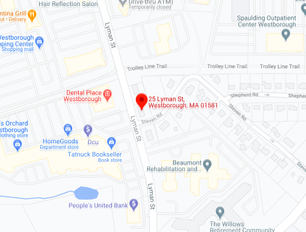Clinician Spotlight: An Interview with Jessica Levesque, MA By Lauren Chapin, LICSWWelcome to the sixth installment of Clinician Spotlight, a series where I sit down with some of our wonderful therapists for a cozy conversation about work, mental health, and many life tidbits in between. Last week, I was pleased to meet our newest clinician, Jessica Levesque, MA. Please join me in welcoming Jessica to the Castlebrook team where she is excited to utilize play therapy in her work with children. She also discusses the importance of having fun in session, her passion for holistic care, and how she incorporates play into her own life.
******** Lauren: Hi Jessica, it’s great to meet you! Thank you for taking the time to tell me about yourself. I know that part of your background is school based counseling, what led you to private practice? Jessica: Yes! Actually, while counseling is part of my school based work at a specialist level as a licensed psychologist, I also have a significant special education background, working collectively with Speech Pathologists, BCBA, and Occupational therapists. I’ve always wanted to do some private practice on the side while working in schools. Now that my kids are older, I finally have the opportunity to do that. I’ve been practicing for about 20 years, and I feel like I have a good amount of tools in the toolbox to give back. Lauren: Which tools will you be able to utilize at Castlebrook that you aren’t able to in a school setting? Jessica: While the school setting doesn’t always offer the opportunity to delve deeper into children’s issues, I am looking forward to private practice filling that gap by allowing my clients to work through those things with me in the moment instead of needing to refer out. The community setting will also enable me to help kids more holistically since I can have more direct parent involvement which improves treatment outcomes. Lauren: You mention that you’ve been practicing for 20 years. Has that always been with kids? Jessica: Not necessarily. While I was in school, I began my training with adults who had significant mental health needs. Following this experience, I thought maybe I’d like to try working with kids instead, and I started working with the young autistic population and as a preschool teacher. I found that I really liked the younger ages, and eventually, began working in my most recent role as a specialist level licensed psychologist in schools. Fast forward to the last five years, I’ve noticed an increase in trauma responsiveness in the schools and have had the opportunity to build my skill set through both this trauma work and DBT training. After these years of experience, I feel I am now at a point in my career where I feel comfortable taking on a change in setting to make an even bigger impact. For me, the most rewarding part of this job is when people feel like they have more of a handle on things and feel better about themselves. Lauren: It’s definitely necessary now in the current landscape where there is a shortage of clinicians who specialize in working with children. Jessica: Absolutely. Sometimes even teachers are floored at the increasing level of challenges children are facing, understanding their ever-evolving mental health needs, and the wait lists for treatment. Lauren: I bet! You mentioned being trauma informed, do you feel as if you’re leaning towards working with trauma as a specialty or do you have other interests as well? Jessica: I guess there are multiple answers to that question. Historically, I've done individual therapy and small group therapy utilizing curriculums such as social thinking and zones of regulation for children on the autism spectrum. Potentially, I’d like to run a weekend group for neurodiverse children who may have an autism spectrum disorder or challenges with social communication and have a need for understanding their social world, managing their emotions, and improving their executive functioning. I primarily work with children from around age three, preschool, to age 13, eighth grade. I also work with children who experience mood dysregulation of negative affect or anger control, anxiousness or depression, and other related issues, including selective mutism. The majority of my approach is based in cognitive behavior therapy, but I also have done some work with both art therapy and, as a result of DBT training, mindfulness. With kids, I think it’s important to use a lot of visual support and hands-on activities. Lauren: What would be an example of that? Jessica: For a more hands-on approach, I started delving into somatic work and utilized movement to help kids regulate, especially kids who were resistant to treatment due to trauma. I tried having kids use a percussion drum to feel the vibrations in their body and that worked really well. For me, it’s all about utilizing a strengths-based approach to find what works for them. It’s not going to be effective if they just come in and don’t talk. Understanding emotions can be difficult for children. They don’t have the vocabulary yet to express themselves verbally, so trying to process feelings mentally and physically is overwhelming. When they’re ready, I help them label what emotion they are feeling and recognize how it shows up in their body. I also use bibliotherapy to help with big emotions. Lauren: I love that. What’s your go-to book series? Jessica: I love the Lori Lite series. She covers a lot of coping skills. For example, “Sea Otter Cove” is about deep breathing and “Angry Octopus” focuses on progressive muscle relaxation. I’ve also found things over the years that coincide with these books, like puppets, so I can utilize a multi-faceted approach with these lessons. Kids need to have fun and it has to be kind of imaginative like using a hula hoop to symbolize personal space. Another series I've been liking is “What Should Danny Do?” by Adir Levi. This series utilizes the idea of having “the power to choose” and helps kids use their coping skills and social skills to decide what they would do in certain situations. Lauren: I’ll have to check those out! Speaking of fun, what are some of the things you do to have fun outside of the play therapy room? Jessica: I paint. At home, I’ll do paint by numbers but I’ve also been doing painting classes as well for about two years now. I’m looking forward to trying a pottery class, too. I like to hike and am part of two hiking clubs. I also like to camp with my family and do other family activities. Spirituality is important to me and I incorporate a lot of mindfulness into my day. I love watching the sunset, sunrise, and listening to the birds. Lauren: That sounds like the perfect way to unwind. Thank you, Jessica, for chatting with me. I’m looking forward to supporting you and the work you do at Castlebrook!
0 Comments
Your comment will be posted after it is approved.
Leave a Reply. |
Archives
May 2025
Categories |
Mission Statement
Castlebrook Counseling Services, Inc. is a group of private practice clinicians with a shared goal of strengthening our community by providing therapy and clinical support designed for children, adults, and families to successfully meet life’s challenges.
 RSS Feed
RSS Feed

